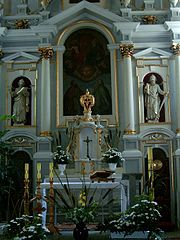
A History Of The Mass And Its Ceremonies In The Eastern And Western Church -Rev John O'Brien A.M.
THE PATER NOSTER
IN concluding the Canon the priest raises his voice and says aloud, “Per omnia sæcula sæculorum”; then, “Oremus”; and after this follows the “Pater noster,” or Lord’s Prayer, to which the following short preface is prefixed: “Being admonished by salutary precepts, and taught by divine institution, we presume to say, ‘Our Father,’ ” etc. According to several authorities of note, the expression, “being admonished by salutary precepts,” refers to the existence of the Discipline of the Secret, in virtue of which it was strictly forbidden to recite, among other things, the “Lord’s Prayer” in the hearing of the catechumens; but inasmuch as none of this class could be present at this part of the Mass, there was no danger to be apprehended from reciting it aloud. At the Divine Office, however, it was never said but in secret, for catechumens as well as Christians could be present then. This discipline stands yet. The rest of this short preface refers to what our Lord said to his disciples on the quantity and quality of prayer, for the “Pater noster” was formulated by himself as a model for their guidance (Enchiridion Sacrif. Missæ Bened. XIV., p. 95; J. Pleyer, S.J., De Sacr. Miss. Sacrif., p. 7).
In the Liturgy of St. James this little preface is thus worded: “Grant us, O Lord, and lover of men! with boldness, without condemnation, with a pure heart, with a broken spirit, with a face that needs not to be ashamed, with hallowed lips, to dare to call upon thee, our Holy God and Father in heaven, and say, ‘Our Father,’ ” etc. All the Oriental liturgies have some preface of this kind here.
Throughout the Western Church it is the priest himself who says the “Pater noster,” but in the Eastern Church it is said by people and priest together. The Mozarabics add “Amen” after each of its different petitions.
In the time of Pope Clement III. (1187–1191), while the Crusaders were engaged in fighting for the recovery of the sacred places of Palestine, it was customary to recite immediately after this prayer the psalm “Deus venerunt gentes”—“O God! the heathens are come into thy inheritance.” Pope Innocent III. ordered the same psalm to be sung, together with a verse and a prayer, after the “Pax”; and by a decree of Pope John XXII. (1316–1334) the psalm “Lætatus sum” was to be recited in every Mass after the “Pater noster” for the extinction of heresies and schisms (Romsee, p. 255).
We had almost forgotten to mention that when the Pope celebrates on Easter Sunday, “Amen” is never responded to the “Per omnia sæcula sæculorum,” immediately before the “Pater noster,” and this to commemorate a miracle once wrought in favor of Pope Gregory the Great, to whom the angels responded at this place upon a certain Easter morning (ibid.)
Copyright ©1999-2023 Wildfire Fellowship, Inc all rights reserved

 Keep Site Running
Keep Site Running